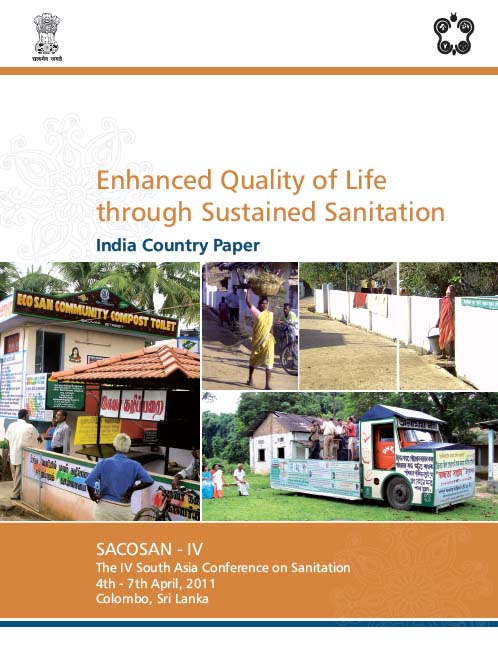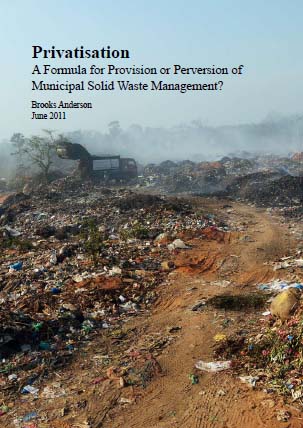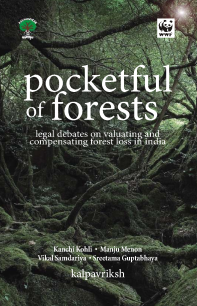India
Sanskriti Pratishthan invites entries for Prabha Dutt fellowship in Journalism
Posted on 25 Jun, 2011 01:51 PMSanskriti Pratishthan has established the coveted Sanskriti awards and fellowships for young talent in different fields.
The Prabha Dutt Fellowship in Journalism encourages young women who wish to investigate and research on any topic of contemporary relevance. This fellowship will be given every year. The fellow may work on a book or monograph for subsequent publication within the given time frame.
The purpose of the Fellowship is to encourage young mid career women journalists to develop their potential by pursuing meaningful projects without having to work under the pressures of short deadlines. The Fellowship carries a grant of Rs 1,00,000 including travel expenses.The work can be executed in Hindi, English or any regional language.
Assessment study of impact and sustainability of Nirmal Gram Puraskar – A report by CMS Environment
Posted on 24 Jun, 2011 11:02 PMNGP was initiated in Oct 2003 to encourage Panchayati Raj Institutions (PRIs), block and districts to take up sanitation promotion, a post achievement, award-cum-fiscal incentive scheme. The eligibility criteria for the PRIs to receive NGP include: Gram Panchayats, Blocks and Districts, which achieve 100 per cent sanitation coverage in terms of: (1) 100 per cent sanitation coverage of individual households (2) 100 per cent school and anganwadis sanitation coverage (3) Free from open defecation and (4) Clean environment maintenance (liquid and solid waste management).
Enhanced quality of life through sustained sanitation - India country paper for South Asia Conference on Sanitation
Posted on 24 Jun, 2011 10:09 PM This India Country Paper on Enhanced Quality of Life through Sustained Sanitation was prepared for South Asia Conference on Sanitation (SACOSAN) IV held at Colombo, Sri Lanka in April, 2011.
This India Country Paper on Enhanced Quality of Life through Sustained Sanitation was prepared for South Asia Conference on Sanitation (SACOSAN) IV held at Colombo, Sri Lanka in April, 2011.
In rural sanitation, India’s flagship rural sanitation programme, the Total Sanitation Campaign (TSC), continues to be implemented with renewed vigour, and improvements in multiple facets of the programme. The TSC programme was given a further boost with the introduction of the Nirmal Gram Puraskar (NGP), an innovative incentive scheme for Gram Panchayats, Blocks and Districts. The rural sanitation sector has continued to receive increasing budgetary support.
Is privatisation a formula for provision or perversion of municipal solid waste management?
Posted on 24 Jun, 2011 09:17 PM
In 2000, in response to a Supreme Court order, the Government of India formulated and enacted the Municipal Solid Wastes (Management and Handling) Rules (hereafter referred to as the Rules) to mitigate a burgeoning solid waste crisis. Pollution from haphazard municipal solid waste disposal was gravely jeopardizing public health, thereby undermining the nation’s development gains.
The Rules’ prime objective was to protect public health and the environment by minimizing disposal of waste in landfills, thereby aligning the government’s municipal waste management policy with its commitments to international treaties to reduce greenhouse gas emissions, control the production of persistent organic pollutants, conserve finite resources, and achieve broad development targets.
Rainfed agriculture: Unlocking the potential – A book by CAB International
Posted on 24 Jun, 2011 08:39 PMThis is the seventh book by CAB International in the series on Comprehensive Assessment of Water Management.
Scaling up rural sanitation: Findings from the impact evaluation baseline survey in Madhya Pradesh
Posted on 24 Jun, 2011 03:43 PMThis report is a part of a series of papers that analysed the baseline data from all countries where the program was implemented.
Alternate management approaches for village water supply systems - Case studies from Maharashtra - A field note by WSP
Posted on 23 Jun, 2011 05:25 PMIt documents the approaches in a context where the state government agencies responsible for construction and management of rural water supply systems have been found to be facing limitations in O&M arrangements.
The traditional approach to provision of rural water supply in India has been supply driven, with emphasis on norms and targets and on construction and creation of assets, but with very little concern for sustainable arrangements for better management and maintenance of the facilities built. The viewpoint that users are ‘beneficiaries’ rather than empowered stakeholders among the service providers has led to alienation of the users.
UN-HABITAT invites entries for Urban arts and design youth competition – Apply by June 28, 2011
Posted on 23 Jun, 2011 11:43 AM The United Nations Human Settlements Programme, UN-HABITAT, is the United Nations agency for human settlements. It is mandated by the UN General Assembly to promote socially and environmentally sustainable towns and cities with the goal of providing adequate shelter for all.
The United Nations Human Settlements Programme, UN-HABITAT, is the United Nations agency for human settlements. It is mandated by the UN General Assembly to promote socially and environmentally sustainable towns and cities with the goal of providing adequate shelter for all.
"Upscaling innovative technologies" - Invites opinions and insights by 26 June 2011 as part of the 12th Five Year Plan sub group consultations, on increasing system of rice Intensification (SRI)
Posted on 22 Jun, 2011 04:39 PMThe purpose of the survey is to reflect on the experiences of professionals, researchers, policy managers and farmers on dissemination and sustainability of SRI practices and principles. This survey seeks to build on the experience of SRI professionals to look at the future role of SRI on household food security and poverty reduction, the institutional framework to expand SRI. In addition, the extent to which soil health, water stress, adoption/dis-adoption and capacity building issues have been accommodated within SRI policy will also be explored.
